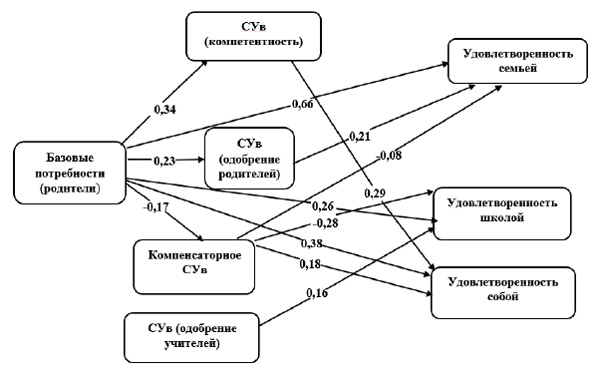Article
Lunkina M.V. (2019). Self-esteem contingencies and satisfaction of basic psychological needs as sources of psychological well-being of adolescent. Moscow University Psychology Bulletin, 1, 214-229
Abstract
Relevance. The problem of self-esteem contingenciesis currently less studied empirically than the level and the stability of self-esteem. But at the same time self-esteem contingencies is verypromising topic that allows to better understanding the problems of the psychological well-being and personal maturity of the adolescent.
Objective. The study is devoted to the connection of such types of self-esteem contingencies of adolescent as self-esteem based on competence, self-esteem based on teacher approval, self-esteem based on parental approval and compensatory self-esteem with various aspects of adolescent well-being and satisfaction of basic psychological needs by parents.
Methods. 223 adolescents were recruited for the study. Techniques were filled during school lesson. It was used Rosenberg’s self-esteem scale, the multidimensional scale of schoolchildren’s life satisfaction, the scale of basic psychological needs satisfaction in family and an author’s scale for diagnosing self-esteem contingencies.
Results. It was shown that the types of self-esteem contingenciesmake a different contribution to psychological well-being. Self-esteem based on competence contributes to self-satisfaction, self-esteem based on the approval of parents - family satisfaction, and self-esteem based on the approval of teachers - satisfaction by school. Compensatory self-esteem although leads to self-satisfaction, hinders satisfaction with family and school. At the same time, adolescents whose parents satisfy their basic psychological needs are more satisfied and have more authentic types of self-esteemcontingencies.
Conclusions. The self-esteem based on competence and self-esteem based on obtaining approval and support from significant people are more authentic, healthy and contributing to psychological well-being than compensatory one. The findings provide grounds for adolescent’s training aimed at developing psychological competencies that promote self-esteem such skills of constructive thinking, formulation and advocacy of their position, self-evaluation and coping with distress. As well as for counseling with parents and teachers to build relationships based on the provision of autonomy, support and respect for adolescents.
Sections: Theoretical studies;
Empirical studies;
Received: 12/17/2018
Accepted: 12/24/2018
Pages: 214-229
DOI: 10.11621/vsp.2019.01.214
Keywords: contingencies of selfesteem; self-esteem; subjective well-being; basic psychological needs; adolescents;
Available Online 15.03.2019

Pic.1..
Table 1.
|
|
1 |
2 |
3 |
4 |
5 |
6 |
7 |
8 |
9 |
|
1. СУв, основанное на компетентности |
- |
|
|
|
|
|
|
|
|
|
2. СУв, основанное на одобрении учителей |
.40** |
- |
|
|
|
|
|
|
|
|
3. СУв, основанное на одобрении родителей |
.48** |
.62** |
- |
|
|
|
|
|
|
|
4. Компенсаторное СУв |
‒.16* |
‒.03 |
.04 |
- |
|
|
|
|
|
|
5. Общее СУв |
.33** |
.21** |
.32** |
.04 |
- |
|
|
|
|
|
6. Удовлетворенность семьей |
.40** |
.24** |
.43** |
‒.18** |
.38** |
- |
|
|
|
|
7. Удовлетворенность школой |
.26** |
.22** |
.13 |
‒.33** |
.22** |
.41** |
- |
|
|
|
8. Удовлетворенность собой |
.42** |
.26** |
.38** |
.07 |
.60** |
.56** |
.30** |
- |
|
|
9. Удовлетворенность базовых потребностей |
.35** |
.07 |
.24** |
‒.28** |
.44** |
.66** |
.35** |
.37** |
-
|
|
М |
3.98 |
3.18 |
3.26 |
2.59 |
29.28 |
3.79 |
3.00 |
3.24 |
3.02 |
|
SD |
0.84 |
1.03 |
0.98 |
0.98 |
4.94 |
0.86 |
0.78 |
0.83 |
0.51 |
For citing this article:
Lunkina M.V. (2019). Self-esteem contingencies and satisfaction of basic psychological needs as sources of psychological well-being of adolescent. Moscow University Psychology Bulletin, 1, 214-229








